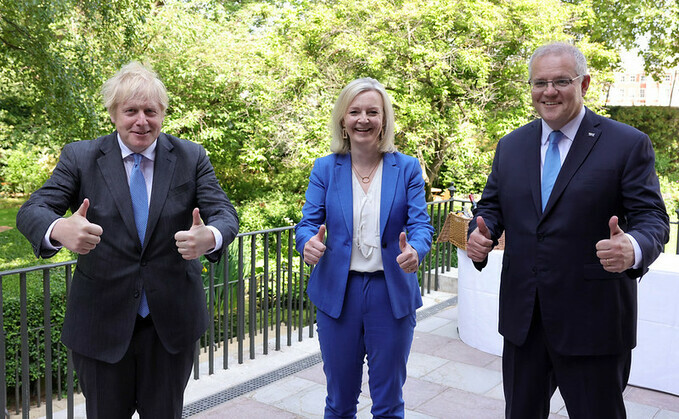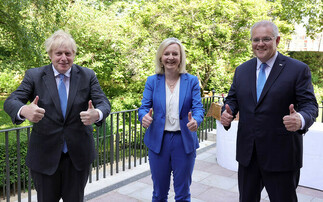Boris Johnson and Liz Truss met with then-Australian PM Scott Morrison in 2021 to finalise the trade deal | Credit: Andrew Parsons / No 10 Downing Street
Environmental group Feedback granted initial hearing to present case that the government failed to adequately assess climate implications of trade agreement with Australia
The government is set to face a court hearing over allegations it carried out an "inadequate" assessment of the potential climate impacts of the free trade agreement it signed with Australia in 2021, which granted Australian farmers access to the UK market.
Environmental group Feedback yesterday announced it had been granted an initial hearing at the High Court to make the case for a full Judicial Review of the implementing legislation for the UK's controversial free trade deal with Australia, which has faced fierce criticism from green groups and farmers alike. No date has yet been announced for the hearing.
The free trade agreement (FTA) gives Australian producers significant access to the UK market to sell beef, lamb, mutton, and dairy products, which Feedback argues risks undercutting British farmers who typically have to adhere to higher environmental and animal welfare standards.
The FTA came into force in May last year at around the same time as a similar free trade deal with New Zealand. Both trade deals were criticised by environmental and farming groups who argued the agreements failed to incorporate sufficiently robust climate, environmental, and animal welfare standards for imported goods.
Feedback's legal challenge concerns the Australia FTA, alleging the government failed to carry out an adequate impact assessment of the potential carbon emissions associated with allowing Australian farmers to sell their meat and dairy produce in the UK.
The government concluded it was not possible to carry out such an assessment as the relative emissions associated with cattle were too "variable".
But Feedback disputes this claim, arguing experts have been able to demonstrate a consistent application of emissions measurement methodology that would have shown a considerable difference in the climate impacts of livestock produced in the UK and that from Australia.
As a result, the environmental group argues the FTA with Australia is likely to have a material impact on greenhouse gas emissions and the ability to achieve international climate targets, adding that the UK is bound by domestic and international legal obligations - including through the Paris Agreement - to take environmental and climate considerations into account when setting policies.
Carina Millstone, executive director of Feedback, said the legal challenge would test whether the UK government adequately assessed the impact of the Australia trade agreement, and how this may impact its ability to achieve its legally binding net zero targets.
"Rather than relying on flimsy environmental impact assessments, it is imperative that the government truly assess the climate impacts of its trade deals, so that trade supports the curbing of emissions at home and abroad, rather than drive further catastrophic warming," she said. "We look forward to hearing how the government will meet its obligations under the Paris Agreement in this trade deal, and all others."
The government has repeatedly insisted it remains committed to upholding Britain's environmental standards in post-Brexit trade arrangements, and earlier this week the Prime Minister Rishi Sunak told farmers "I have your back" as he announced a package of fresh agricultural policy this week.
A spokesperson for the Department for Business and Trade said: "We do not comment on legal proceedings."
Labour and Conservative trade policy row
Britain's food security and trade arrangements have been under the political spotlight this week, with Sunak delivering a speech yesterday to the National Farmers Union (NFU) conference in Birmingham, during which he announced an uplift in grant funding for farmers to support the adoption of agri-technologies and confirmed an extension to the Sustainable Farming Incentive scheme.
NFU president Minette Batters urged Sunak to include a pledge in the Conservative Party's general election manifesto to embed minimum food and farming standards requirements in the UK's international trading policy, in order to prevent British farmers being undercut by lower quality produce from abroad.
"Really, the Conservatives have to be very, very clear at the next election that they will introduce the Core Standards standard," Batters told the conference, as she criticised previous Prime Ministers Boris Johnson and Liz Truss over their liberal approach to trade.
But Batters also said the opposition Labour Party had provided scant details on its trade policy plans. "With Starmer, I'm not yet sure what their trade policy is, if I'm honest, and therein lies another challenge," she said, in comments reported by The Guardian. "Labour must have policies. They have no trade policy that they have shared publicly."
Her comments yesterday came ahead of a speech this morning at the NFU conference by Labour's Shadow Defra Minister Daniel Ziechner, who promised a "new deal for farmers" if the Party forms the next UK government.
He argued that "food security is national security" and said a Labour government would "resolutely back British farmers, reducing our reliance on insecure imports, supporting high quality, local produce for consumers, and ending the shameful new reality of those empty supermarket shelves".
Zeichner also promised to "lower the red tape farmers face at our borders, both of imports and exports" as part of a "new deal for farmers".
"Ministers have left farmers too vulnerable to low quality imports that undercut our people," he said. "You made this point very forcibly with that massive petition a few years ago. We supported you. But I'm afraid we weren't listened to. The government's own assessments have indicated that the New Zealand trade deal would result in an economic contraction of £48m for agriculture and fisheries."
Moreover, a Labour government would seek a veterinary agreement with the EU "that will get British food exports moving again, and ensure standards are safeguarded", in addition to setting a quota for public sector purchasing of homegrown produce, he said.
"A Labour government will buy, make and sell more home-grown sustainable food supporting farmers across the country through public procurement," said Zeichner. "Using the government's own purchasing power to ensure that at least half of all food in our hospitals and prisons is locally produced or certified to higher environmental production standards. That is more than a billion pounds redirected into the pockets of British farmers."
Want to understand what is going on at the cutting edge of sustainability? Check out BusinessGreen Intelligence - the premier information for professionals focused on the UK's green economy.










